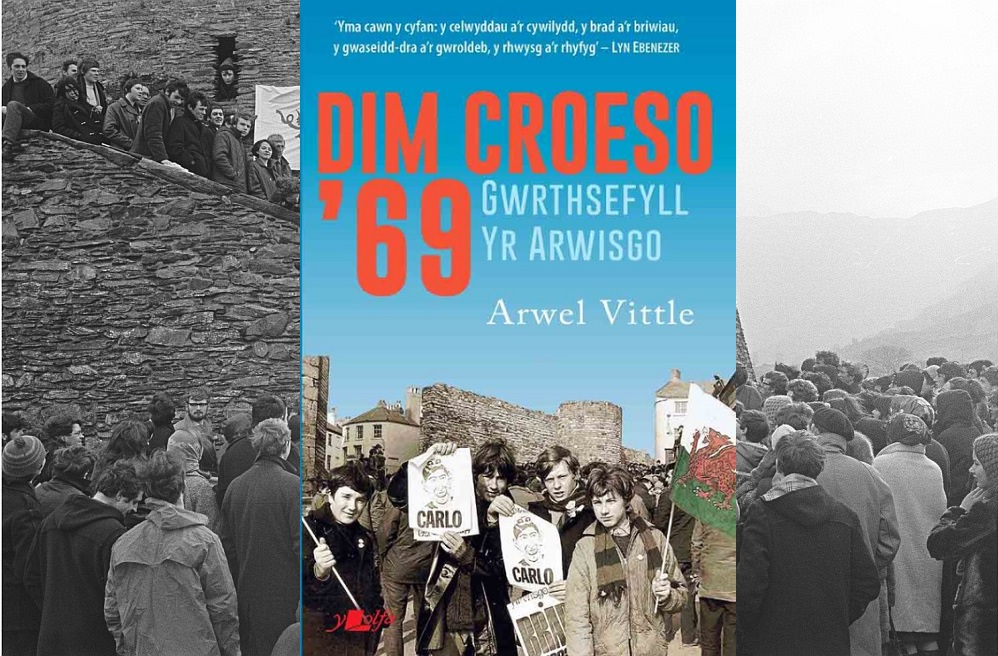Review: Dim Croeso ’69 – Gwrthsefyll yr Arwisgo

Jon Gower
The 1969 Investiture of Charles Philip Arthur George as Prince of Wales was a seismic event in modern Welsh history, exposing or causing rifts in public opinion which sometimes widened into chasms. As the title of this commendably level-head book explains, it examines the lack of welcome for the crowning in some quarters and chronicles various acts of resistance against it.
The drowning of the Welsh-speaking community of Tryweryn earlier in the sixties had suggested that activism was powerless against the might of the State machine. Yet, as Vittle suggests the Caernarfon crowning showed that nationalism wasn’t yet dead, proved by the measures necessary to allow it to happen.
Thousands of soldiers were stationed in makeshift barracks and lined roads in and out of the town on the day with bayonets drawn. Well over a thousand uniformed police were drafted in, backed up by an equivalent number of Special Branch and undercover cops patrolling the town and its wider hinterland.
But the book doesn’t just concentrate on the day itself but traces the build-up to it, which included the brief period of time Charles spent learning Welsh at Aberystwyth university, which galvanised many students into protest mode. It also saw the appearance of publicity-seeking outfits such as the Free Wales Army and the secretive Mudiad Amddiffyn Cymru, which set about systematically bombing select targets such as the tax office in Chester and the central police station in Cardiff.
Ping-pong
The lead up to an event, seen by some as a Labour tactic to stymie the growing electoral success of Plaid Cymru – but in truth was instigated earlier by the Tory government under Macmillan – saw mass protests organised by Cymdeithas yr Iaith, which attracted 5000 people to Caernarfon’s quayside. But some of the protests were smaller, and more spontaneous, such as the schoolchildren of Ysgol y Gader in Dolgellau who petitioned the headmaster and subsequently staged a sit-in rather than send a representive to attend the crowning.
Unbeknown to those who saw it placed on the young man’s head, the crown itself, created by eccentric designer Louis Osman, was badly produced and at the last minute the small silver orb on top had to be replaced by a ping-pong ball, covered in foil.
Had they known, this fact would have been richly savoured by the legion of satirists who pilloried the prince, from the cartoonists who depicted lickspittle toadies licking royal toecaps to protest singer Dafydd Iwan, whose song ‘Carlo’ hugged the numbed one spot in the Welsh language pop charts for weeks, presenting Charles as a feckless polo-player.
Other songs had different targets, such as Dyniadon Ynfyd Hirfelyn Tesog’s ‘Dicsi’r Glust’ which used the melody of Mack the Knife and a ‘walls have ears’ sentiment to mock Dicsi, a.k.a. Jack Dixon who headed a special police unit located in Shrewsbury.
Miss Croeso
‘Dim Croeso ‘69’ usefully takes us back to through history to remind us about the death of the last Welsh prince, Llywelyn in Cilmeri in 1282 and how his head was exhibited at the Tower of London, crowned with ivy.
But it was Lloyd George who injected pomp and ceremony into the 1911 investiture of Edward VIII as a means of serving his own political ends and reacting to the growth of Welsh nationalism. Until then the event had been small-scale and stripped back, performed before a gathering in Parliament. Dissent to the showier 1911 event was limited, even though Keir Hardie, the member for Merthyr saw it as a symbol of historical oppression.
The PR case for Charles as Prince was made on a range of fronts, from specious heraldry by the antiquarian Major Francis Jones who connected Charles to earlier Welsh princes to the Welsh Tourist Board’s attempt to package a months’ long celebration. They even held a competition to find ‘Miss Croeso ‘69’ which only attracted half the expected contestants.
Meanwhile, activists such as Owain Williams were being framed and the biggest purge was the mass arrest of members of the Free Wales Army with a resulting trial orchestrated to conclude on the very day of the investiture. Dignitaries from all over the world convened in north Wales even as MAC’s disruptive plans ended in tragedy as two men were blown up in Abergele, and just after the investiture a 10-year-old boy was maimed when he trod on an unexploded device.
The book tells the whole story mainly through interviews with a wide array of players such as Cymdeithas yr Iaith’s Ffred Ffransis and Gareth Miles, MAC’s John Jenkins and protest singer and later politician Dafydd Iwan coupled with detailed desk research as well as telling excerpts from Manon Rhys’ novel ‘Ad Astra.’
Together they chronicle a time of fervid activity, public debate and passionate resistance, when Dafydd Elis-Thomas wrote articles entitled ‘Parliament Not a Prince’ and the FWA’s Dennis Cosslet cheekily invited Prime Minister Harold Wilson to a peace conference on board a coracle on the river Teifi.
It was a time of sometimes blanket police surveillance and shadowy agents provocateurs. As Saunders Lewis put it, it was close to open warfare between the government’s police and Welsh-speaking young people, and this at a time when the world order was being challenged by such activists, from the burning streets of Paris to the anti-Vietnam protests in American cities.
Some who took part in the Investiture, such as the poet Cynan, were knighted for their services. As this book shows others look back on an overcast day in Caernarfon and see it as a day when a whole country was benighted.
Dim Croeso ’69 by Arwel Vittle is published by y Lolfa, costs £9.99 and can be bought here.
Support our Nation today
For the price of a cup of coffee a month you can help us create an independent, not-for-profit, national news service for the people of Wales, by the people of Wales.







